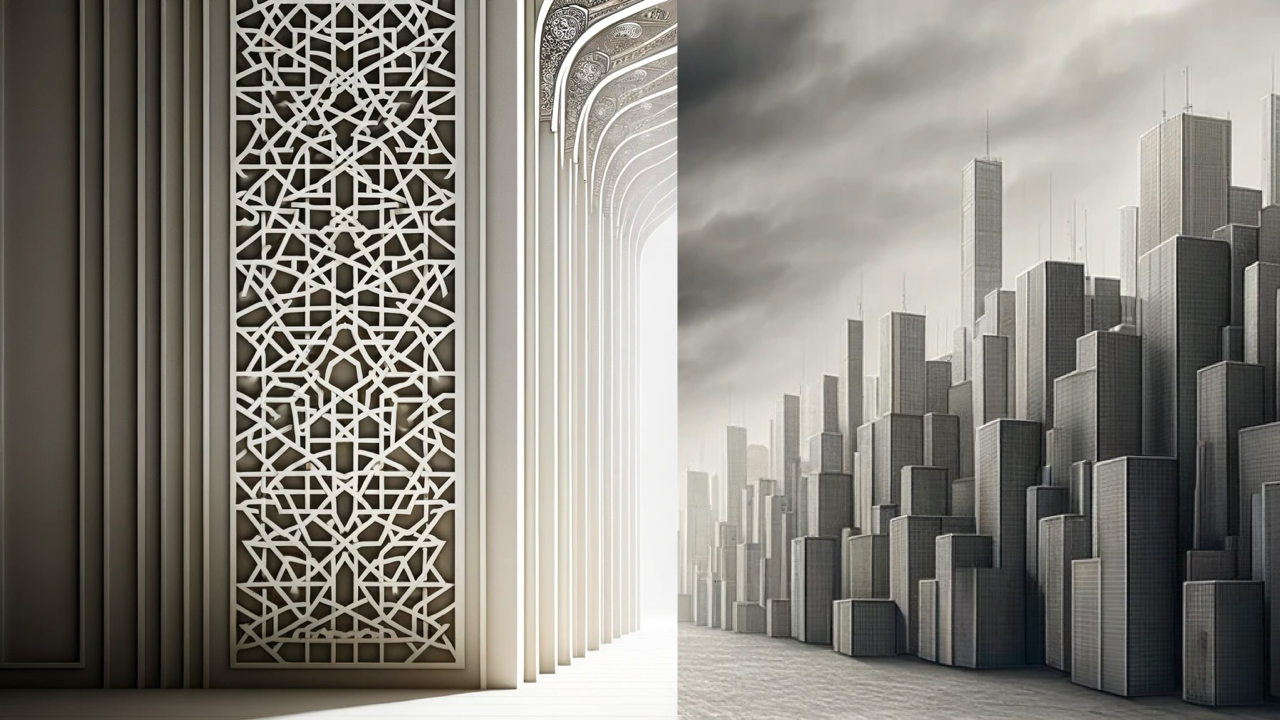
The following is an article that I wrote back in June 2007 after a conversation with Dr. Sherman Jackson regarding the expectations of Muslims as it related to the sharī’ah and its capacity for civilizational building. I was recently asked if the article was still available so I’m reposting it here.
There is much debate these days regarding Islam, the West, democracy, human rights, statism and a whole slew of other topics which all collide in a jumble of arm chair reactions and suppositions. Slogans are volleyed at slogans – a cycle of retaliation. As someone who is now more frequently called upon to talk about Islam (or more specifically, to “explain Islam”), this has become an increasingly difficult and sophisticated task. One of the most glaring difficulties is that the dialog is often between two comparatives – meaning that the position that many non-Muslim (and quite frankly, anti-Muslim) opponents is that the West is the criterion in which to judge the rest of the “free world” by. As Olivier Roy illustrates their case, “that there is no salvation (no modernity) outside of the Western political model.” (Roy, Olivier. The Political Failure of Islam. Cambridge: Harvard University Press, 1994. Pg. 8.). To be fair, there are many Muslims today who have an imagined concept of what the Muslim society or even ummah, should be: a societal body governed by sharī’ah, where within both the sovereign and the people are subjects to sharī’ah. That there is no law, secular or religious, that works either parallel or perpendicular to the sharī’ah. To a great extent, this imagination is evoked from the first early communities of Muslim, the Pious Ancestors and the Rightly Guided Khalifas. To bring us back to our impasse, the Western critic sees Islam locked in an ahistorical, static mode, and mainly due to their (limited, in my opinion) understanding of sharī’ah, Muslims can never break out of this mold and therefore Islam and Muslims are doomed to an at best social structure that something out of the Middle Ages. Ironically, many Muslims use the same said argument as their clarion call to both Islam and the establishment of the Islamic state – Islam is timeless, and due to its Divinely Inspired system of lifestyle, is beyond reproach.
In order to move beyond this seemingly immutable approach on both parties, comparativism will have to be dropped. Instead, both parties will have to accept a certain degree of innate legitimacy on the other, even if they will never adopt one another’s system. In the simplest terms, proponents of Islam and the West will have to agree to disagree. But this is only the beginning of cross-societal understanding. In addition to such modern topics as statism, more enduring subjects such as freedom and justice will also have to be engaged. It is from here that I shall steer the direction of this post.
A short while back, I was asked to explain the stance of Islam on such topics as freedom and more specifically, freedom of speech. This was not too long after the Danish cartoons were released, much to the chagrin of many Muslims. The person inquiring, a white, upper-class woman, asked why Muslims do not support freedom of speech. I replied that in order to answer her question, I would need further description on what she defined as “freedom of speech”. The look I received from the woman was one of disbelief. “Why”, she explained in a voice meant for a child, “it’s the right to say whatever you want”. While I do not believe that all people, or indeed, that all white, upper-class women hold to this belief, I will nonetheless use it as the platform to attempt to illustrate some points on how Islam might potentially view such things as rights, freedom, and justice in contrast to what is held as the “norm” here in America. The following is a more in-depth summary of what I explained to her.
To begin with, I shall lay out my own personal interpretations of how freedom is understood in America, mostly from a pop culture point of view. Most Americans I have encountered view freedom as the ability to act, talk, walk, dress and simply, “be” as you please. The idea that there should be any censure on these items would be an infringement on private rights. In the recent Don Imus scandal, freedom of speech was invoked in support of Mr. Imus, in that it was his right as an American to speak his mind and to voice his opinion, however it may insult or even harm members of the general public. Similarly, a woman has the right to dress as she pleases. This can include everything from tight, revealing clothing to headscarf and veil (though, the same right that is extended to a woman in a bikini is often overturned towards Muslim women who choose to cover – the implied meaning that they must be coerced, backwards, or insane). The rights of the general populous or good are taken as a secondary consideration in the right to, “express freedom”.
It is here we see the engagement of disagreeing parties over Islam’s supposed lack of concern for freedom of speech. For non-Muslim/anti-Muslim critics, it is assumed that Islam as a value system is opposed to freedom of speech. In my opinion, these critics are wrong. My indictment of them is one of either ignorance of the subtle intricacy of Islam (and here I am referring to sharī’ah or Islamic law) or ideological disagreement that carries with it an active disregard for the above. Instead, Islam has the potential for a different approach to the concept of freedom, which takes us back to the title of this post: public minimum, private maximum.
In Islam, freedom (hurriyah حرية, in Arabic) is primarily sought in the private sphere. One’s personal tastes and desires can be sought to their fullest extent in the private sector, be they to the personal empowerment or detriment, and regardless of their potential for being morally suspect. Let me explain this a bit further. Homosexuality is one of the hot button topics we hear today. Religious groups of all affiliations flock to support or to oppose such legislation. But under sharī’ah, which has limits on its ability to extend to private lives, a ban on homosexual marriage for example, would be potentially inadmissible. Islam views marriage as a private social or religious contract, and given Islam’s stance on homosexuality (i.e., Islam does not condone homosexuality as a valid lifestyle) it would have no role in bringing any such unions to fruition. In other words, homosexuals would be free to conduct their own marriages because Islam, or more precisely, sharī’ah, does not extend to this area. To be sure, there are many who will disagree with me on this, and it should not be mistook as an attempt to legitimize what God has made illegitimate, but instead, this is an example on how Islam/sharī’ah have the ability to coexist and even support freedoms that it has serious moral misgivings with.
Another example would be adultery. Again, an immoral action that potentially is a punishable offense and yet, one of the binding stipulations in order to bring admissible evidence against any such culprits is the having of three witnesses. There is a wisdom here, in that while adultery is a terrible sin, it nonetheless happens. And as a measure to protect private interests, even where they be morally wrong, Islam institutes a system which insulates the privacy of the individual from outside forces. Unless one is traveling in roving packs of three’s, staring through someone’s window, the credibility of bringing an adultery case to trial is exceedingly difficult (no – it was never the intention of Islam/sharī’ah to create an adultery police or even a moral police brigade). Instead, personal piety and awe/fear of God and the Day of Reckoning are the tools that God and his Prophet sought to instill in the believer as the means of avoiding either of the above offenses. Nonetheless, the right to engage in either of the above activities would be a private maximum as well as the means of abstaining from them.
Instead, as I explained to the woman, Islam turns its focus more directly on Justice. Justice (‘adl عدل in Arabic) is one of the primary preoccupations of Islam, the sharī’ah and the Muslims. The Qur’an speaks of justice and not freedom (again, the sharī’ah provides an embedded, tacit modality for engaging in the freedom of private affairs), for justice is always sought in the public domain. Ṭhulm (ظلم), brute aggression or oppression, for which there is no call or right, is the admonition that God speaks about in terms of rulers. In fact, ṭhulm is such a dangerous entity, God warns the believers to fear the fitnah or “trial/ordeal”, as in this Qur’anic passage:
واتقوا فتنة لا تصيبن الذين ظلموا منكم خاصة – واعلموا أن الله شديد العقاب
“And fear the trial of systematic domination which targets not solely those among you who commit acts of grave injustice but rather indiscriminately. And know that God is severe in punishment.” Qur’an 8: 25
God uses the verb, aṣāba (أصاب iv), but in the negative (lā tuṣībanna). Aṣāba means to strike directly, such as an arrow hitting its target. But when used in the negative, it implies a widespread, indiscriminate targeting, in which anyone or anything could be hit or affected, aside from any intended target. In this sense, the believer is admonished to be God-conscious of the “trial of systematic oppression (fitnah)” in that it does not restrict itself to simply affecting its intended target – it affects the whole population. Because of this, as a short example, justice plays a more paramount role because it ensures the public right to engage in private affairs by investigating the maṣlaḥah (مصلحة common good or welfare of the society in sharī’ah terms). This is why totalitarianism is intolerable under the Islamic/sharī’ah schema. There is a “social contract”, to borrow from Locke, between the sovereign and the public. And when that sovereign transgresses the bounds, it is then permissible if not incumbent upon the public to throw off that yoke of tyranny.
To fully engage this subject more, it would require more time and would be beyond the scope or intention of this post to do so. More, instead, this is meant as a sort of primer for beginning to see how Islam might see freedom and justice in a different light than that of the West – and how it should not detract from its support for individual freedoms. Hat tip to Dr. Jackson.
And God knows best.

